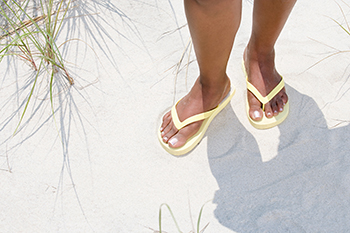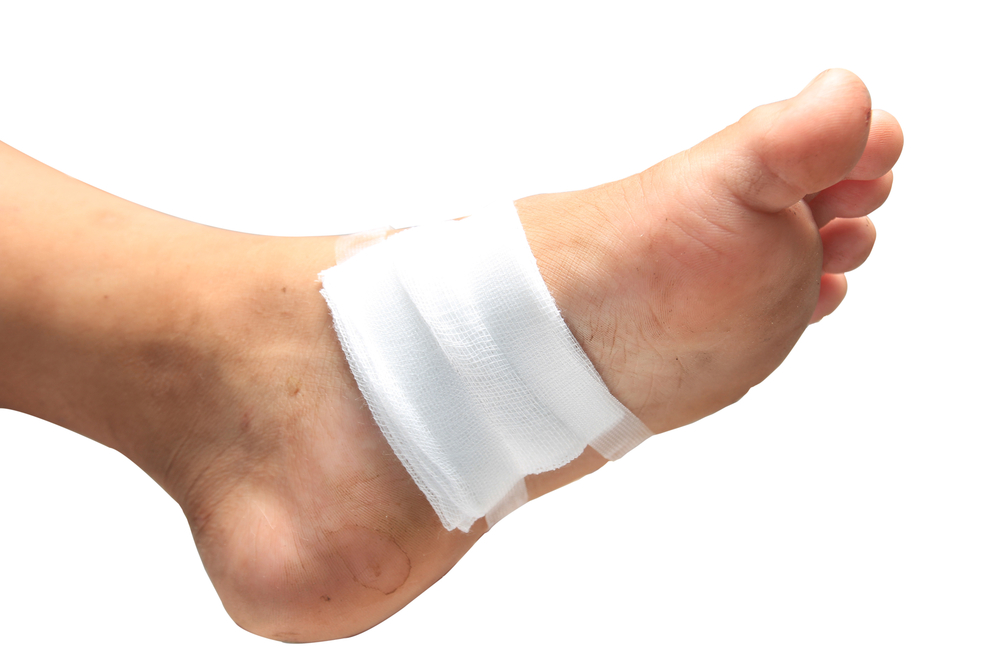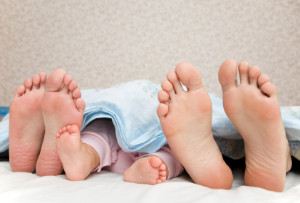Connect With Us
Blog
Items filtered by date: January 2021
Flip Flops May Damage Diabetic Feet
 Flip flops are a type of shoe that is popular to wear during the summer months. There are a variety of styles and colors to choose from and they are simple to wear. Many people enjoy wearing flip flops, despite the fact these types of shoes have little or no arch support. Foot conditions may develop as a result of this, and can cause pain and discomfort. Diabetic patients in particular may be more susceptible to the negative effects of flip flops. Plantar fasciitis affects the heel and sole of the foot, and may gradually occur from wearing shoes that have inadequate arch support. Mild relief may be found when the bottom of the foot is stretched. This can be accomplished by standing on a step while gently lowering one heel at a time. Additionally, many patients find it beneficial to roll the sole of the foot on a tennis ball which is effective in stretching the plantar fascia. If you have questions about how flip flops can affect the feet, it is suggested that you confer with a podiatrist.
Flip flops are a type of shoe that is popular to wear during the summer months. There are a variety of styles and colors to choose from and they are simple to wear. Many people enjoy wearing flip flops, despite the fact these types of shoes have little or no arch support. Foot conditions may develop as a result of this, and can cause pain and discomfort. Diabetic patients in particular may be more susceptible to the negative effects of flip flops. Plantar fasciitis affects the heel and sole of the foot, and may gradually occur from wearing shoes that have inadequate arch support. Mild relief may be found when the bottom of the foot is stretched. This can be accomplished by standing on a step while gently lowering one heel at a time. Additionally, many patients find it beneficial to roll the sole of the foot on a tennis ball which is effective in stretching the plantar fascia. If you have questions about how flip flops can affect the feet, it is suggested that you confer with a podiatrist.
Flip-flops are not always the best choice of footwear. If you have any concerns about your feet or ankles, contact Tanisha Richmond, DPM from Richmond Foot & Ankle, LLC. Our doctor will assist you with all of your foot and ankle needs.
Flip-Flops and Feet
When the weather starts warming up, people enjoy wearing flip-flops. Flip-flops are comfortable, stylish, and easy to slip on and off; they're perfect for any summer beach goer. However, these shoes can cause harm to the feet.
How Can Flip-Flops Affect Me Long-Term?
- Ankle problems
- Hip problems
- Lower back problems
- Pain in the balls of the feet
- Problems with foot arches
- Changes in the way you walk
Are There Injuries Associated with Flip-Flops?
Yes. Since flip-flops are relatively weak and do not provide the same amount of support as sneakers, people who wear flip-flops regularly are more susceptible to injuries. On top of that, the open nature of the shoe makes your feet more prone to other problems, such as cuts and even infections. Common injuries and ailments include:
- Sprained ankles
- Blisters
- Infections
- Cuts and Scrapes
I like Wearing Flip-Flops. Are There Safe Alternatives?
When buying flip-flops, try to find ones that have sturdy soles and that are made of high-quality materials that will support for your feet. These flip-flops will cost more but will also last longer as a result.
If you have any questions please feel free to contact our office located in Dayton, OH . We offer the newest diagnostic and treatment technologies for all your foot and ankle needs.
It's Time for Beautiful Feet
Patients Who Podiatrists Can Help
 Podiatrists specialize in assessing and diagnosing issues related to the feet and ankles. These issues can include skin problems, toenail disorders, foot injuries, foot infections, and overuse injuries. Because diabetic patients are at a higher risk for foot related issues, podiatrists also specialize in helping these patients manage their problems. Elderly patients whose feet hinder their activities should be under the care of a podiatrist, as should children who are having foot problems, especially if these problems affect their ability to walk. Podiatrists are also able to diagnose and treat sports related conditions such as sprains, fractures and overuse injuries. If you are struggling with any foot problem, visiting a podiatrist is highly suggested in order to get a proper diagnosis and treatment plan.
Podiatrists specialize in assessing and diagnosing issues related to the feet and ankles. These issues can include skin problems, toenail disorders, foot injuries, foot infections, and overuse injuries. Because diabetic patients are at a higher risk for foot related issues, podiatrists also specialize in helping these patients manage their problems. Elderly patients whose feet hinder their activities should be under the care of a podiatrist, as should children who are having foot problems, especially if these problems affect their ability to walk. Podiatrists are also able to diagnose and treat sports related conditions such as sprains, fractures and overuse injuries. If you are struggling with any foot problem, visiting a podiatrist is highly suggested in order to get a proper diagnosis and treatment plan.
If you are experiencing pain in the feet or ankles, don’t join the stubborn majority refusing treatment. Feel free to contact Tanisha Richmond, DPM from Richmond Foot & Ankle, LLC. Our doctor can provide the care you need to keep you pain-free and on your feet.
What Is a Podiatrist?
Someone would seek the care of a podiatrist if they have suffered a foot injury or have common foot ailments such as heal spurs, bunions, arch problems, deformities, ingrown toenails, corns, foot and ankle problems, etc.
Podiatric Treatment
A podiatrist will treat the problematic areas of the feet, ankle or lower leg by prescribing the following:
- Physical therapy
- Drugs
- Orthotic inserts or soles
- Surgery on lower extremity fractures
A common podiatric procedure a podiatrist will use is a scanner or force plate which will allow the podiatrist to know the designs of orthotics. Patients are then told to follow a series of tasks to complete the treatment. The computer will scan the foot a see which areas show weight distribution and pressure points. The podiatrist will read the analysis and then determine which treatment plans are available.
If you have any questions please feel free to contact our office located in Dayton, OH . We offer the newest diagnostic and treatment technologies for all your foot and ankle needs.
Why Do Wounds on the Feet Occur?
 People who have diabetes need to be aware of wounds on their feet. If prompt medical attention is not received, cuts and scrapes may heal slowly, and ultimately could become infected. Diabetic patients are also prone to developing peripheral arterial disease which can cause a lack of sensation in the feet. When this occurs it becomes even more difficult to feel existing wounds. Treatment options may include wearing specialized shoes or insoles, and it may help to have any dead tissue removed. Taking antibiotics may accelerate the healing process if the wound has become infected. If you have developed wounds on your feet it is strongly suggested that you are under the care of a podiatrist who can decide what the best treatment is for you.
People who have diabetes need to be aware of wounds on their feet. If prompt medical attention is not received, cuts and scrapes may heal slowly, and ultimately could become infected. Diabetic patients are also prone to developing peripheral arterial disease which can cause a lack of sensation in the feet. When this occurs it becomes even more difficult to feel existing wounds. Treatment options may include wearing specialized shoes or insoles, and it may help to have any dead tissue removed. Taking antibiotics may accelerate the healing process if the wound has become infected. If you have developed wounds on your feet it is strongly suggested that you are under the care of a podiatrist who can decide what the best treatment is for you.
Wound care is an important part in dealing with diabetes. If you have diabetes and a foot wound or would like more information about wound care for diabetics, consult with Tanisha Richmond, DPM from Richmond Foot & Ankle, LLC. Our doctor will assess your condition and provide you with quality foot and ankle treatment.
What Is Wound Care?
Wound care is the practice of taking proper care of a wound. This can range from the smallest to the largest of wounds. While everyone can benefit from proper wound care, it is much more important for diabetics. Diabetics often suffer from poor blood circulation which causes wounds to heal much slower than they would in a non-diabetic.
What Is the Importance of Wound Care?
While it may not seem apparent with small ulcers on the foot, for diabetics, any size ulcer can become infected. Diabetics often also suffer from neuropathy, or nerve loss. This means they might not even feel when they have an ulcer on their foot. If the wound becomes severely infected, amputation may be necessary. Therefore, it is of the upmost importance to properly care for any and all foot wounds.
How to Care for Wounds
The best way to care for foot wounds is to prevent them. For diabetics, this means daily inspections of the feet for any signs of abnormalities or ulcers. It is also recommended to see a podiatrist several times a year for a foot inspection. If you do have an ulcer, run the wound under water to clear dirt from the wound; then apply antibiotic ointment to the wound and cover with a bandage. Bandages should be changed daily and keeping pressure off the wound is smart. It is advised to see a podiatrist, who can keep an eye on it.
If you have any questions, please feel free to contact our office located in Dayton, OH . We offer the newest diagnostic and treatment technologies for all your foot care needs.
Heel Pain Can Be Treated!
Measuring Children’s Feet
 It is beneficial for children who have not begun walking yet to crawl while barefoot. As your child gets older, it is important to have their feet measured. This can be helpful in determining what size shoes your child should wear. The basic rules for choosing the correct shoes include ensuring that there is adequate room for the toes to move freely in, and for the shoes to be made with breathable materials. Many children are born with flat feet, and certain foot ailments may develop over time. It is suggested that you schedule a consultation with a podiatrist who can properly assess any foot conditions that may be present.
It is beneficial for children who have not begun walking yet to crawl while barefoot. As your child gets older, it is important to have their feet measured. This can be helpful in determining what size shoes your child should wear. The basic rules for choosing the correct shoes include ensuring that there is adequate room for the toes to move freely in, and for the shoes to be made with breathable materials. Many children are born with flat feet, and certain foot ailments may develop over time. It is suggested that you schedule a consultation with a podiatrist who can properly assess any foot conditions that may be present.
Making sure that your children maintain good foot health is very important as they grow. If you have any questions, contact Tanisha Richmond, DPM of Richmond Foot & Ankle, LLC. Our doctor can provide the care you need to keep you pain-free and on your feet.
Keeping Children's Feet Healthy
Having healthy feet during childhood can help prevent medical problems later in life, namely in the back and legs. As children grow, their feet require different types of care. Here are some things to consider...
Although babies do not walk yet, it is still very important to take care of their feet.
Avoid putting tight shoes or socks on his or her feet.
Allow the baby to stretch and kick his or her feet to feel comfortable.
As a toddler, kids are now on the move and begin to develop differently. At this age, toddlers are getting a feel for walking, so don’t be alarmed if your toddler is unsteady or ‘walks funny’.
As your child gets older, it is important to teach them how to take care of their feet.
Show them proper hygiene to prevent infections such as fungus.
Be watchful for any pain or injury.
Have all injuries checked by a doctor as soon as possible.
Comfortable, protective shoes should always be worn, especially at play.
If you have any questions please feel free to contact our office located in Dayton, OH . We offer the newest diagnostic and treatment technologies for all your foot and ankle needs.
Blog Archives
- April 2025
- March 2025
- February 2025
- January 2025
- December 2024
- November 2024
- October 2024
- September 2024
- August 2024
- July 2024
- June 2024
- May 2024
- April 2024
- March 2024
- February 2024
- January 2024
- December 2023
- November 2023
- October 2023
- September 2023
- August 2023
- July 2023
- June 2023
- May 2023
- April 2023
- March 2023
- February 2023
- January 2023
- December 2022
- November 2022
- October 2022
- September 2022
- August 2022
- July 2022
- June 2022
- May 2022
- April 2022
- March 2022
- February 2022
- January 2022
- December 2021
- November 2021
- October 2021
- September 2021
- August 2021
- July 2021
- June 2021
- May 2021
- April 2021
- March 2021
- February 2021
- January 2021
- December 2020
- November 2020
- October 2020
- September 2020
- August 2020
- July 2020
- June 2020
- May 2020
- April 2020
- March 2020
- February 2020
- January 2020
- December 2019
- November 2019
- October 2019
- September 2019
- August 2019
- July 2019
- June 2019
- May 2019
- April 2019
- March 2019
- February 2019
- January 2019
- December 2018
- November 2018

